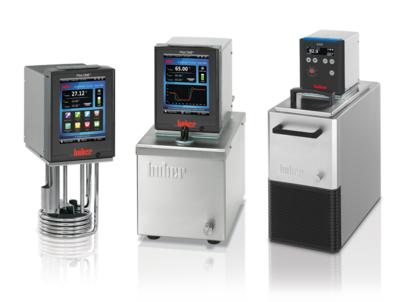Ethernet driver and command-line tool for Huber baths.
pip install huber
For basic tasks, this driver includes a command-line interface. Read the help for more.
huber --help
For more complex projects, use python to automate your workflow. This driver solely uses asynchronous Python ≥3.5.
import asyncio
from huber import Bath
async def get():
async with Bath('192.168.1.100') as bath:
print(await bath.get())
asyncio.run(get())If the bath is communicating, this should print a dictionary of the form:
{
'on': False, # Temperature control (+pump) active
'temperature': {
'bath': 23.49, # Internal (bath) temperature, °C
'setpoint': 20.0 # Temperature setpoint, °C
},
'pump': {
'pressure': 0.0, # Pump head pressure, mbar
'speed': 0, # Pump speed, rpm
'setpoint': 0 # Pump speed setpoint, rpm
},
'status': {
'circulating': False, # True if device is circulating
'controlling': False, # True if temperature control is active
'error': False, # True if an uncleared error is present
'pumping': False, # True if pump is on
'warning': False # True if an uncleared warning is present
},
'fill': 0.0, # Oil level, [0, 1]
'maintenance': 338, # Time until maintenance alarm, days
'warning': { # Only present if warning is detected
'code': -1,
'condition': '',
'recovery': '',
'type': ''
},
'error': { # Only present if error is detected
'code': -1,
'condition': '',
'recovery': '',
'type': ''
}
}The main get method strings together multiple TCP requests, and can take >0.5s
to run. If you don't want all the data, you should instead use the following:
await bath.get_setpoint() # °C
await bath.get_bath_temperature() # °C
await bath.get_process_temperature() # °C (optionally installed)
await bath.get_pressure() # mbar
await bath.get_pump_speed() # rpm
await bath.get_fill_level() # [0, 1]
await bath.get_next_maintenance() # days
await bath.get_status() # boolean dictionary
await bath.get_warning() # None or dictionary
await bath.get_error() # None or dictionaryYou can also start, stop, set temperature setpoint, and set pump speed.
await bath.start()
await bath.stop()
await bath.set_setpoint(50) # °C
await bath.set_pump_speed(2000) # rpm
await bath.clear_warning()
await bath.clear_error()This uses the PB method described in the manual. Note that this does not take advantage of the PB package commands, which would cut down on the data transmission at the cost of extra bath configuration. This also does not take advantage of the high-accuracy PB data transmission, as its resolution is unnecessary in most use cases.
